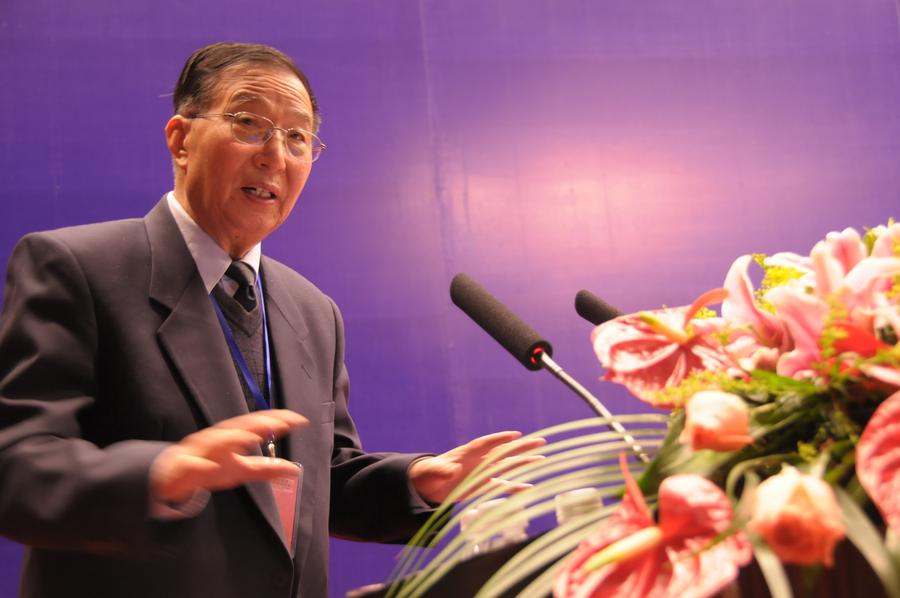-
彩娱乐招商加盟 Chinese scientist's life-long quest to revolutionize wheat breeding
发布日期:2025-01-06 19:30 点击次数:151BEIJING, Sept. 27 (Xinhua) -- At 93, Li Zhensheng, an esteemed academician of the Chinese Academy of Sciences (CAS)彩娱乐招商加盟, has visited more wheat fields than he could ever count, having enjoyed a 70-year career in wheat breeding.
Throughout his life, he has remained devoted to one mission -- ensuring that the Chinese people have enough to eat, and that they eat well.
On the occasion of the 75th anniversary of the founding of the People's Republic of China, Li was awarded the prestigious Medal of the Republic, honoring his decades-long contributions to agriculture and food security.
Born in 1931 in Zibo, east China's Shandong Province, Li's early life was shaped by hardship. He was a teenager during the great famine of the 1940s, witnessing first-hand the devastating effects of food shortages.
Determined to eradicate hunger in China, Li pursued his passion for agriculture. He was enrolled at Shandong Agricultural College and later joined the CAS.
In 1956, he answered the government's call to support the northwestern region, and went to work in Yangling in northwest China's Shaanxi Province. At the time, wheat stripe rust, a destructive wheat disease, was ravaging the Yellow River Basin, slashing annual wheat yields by more than 5 million tonnes.
Scientists were struggling to develop disease-resistant wheat varieties, which often took eight years of breeding efforts but lost resistance in five and a half years on average. However, Li sought a novel solution.
Inspired by his research on pasture grass, which exhibits strong disease resistance, Li proposed an unconventional idea: hybridizing pasture grass with wheat to produce a disease-resistant strain.
The challenge was immense. Crossbreeding such distant relatives posed numerous scientific hurdles. Yet, undeterred, Li and his team toiled relentlessly, walking 10 km each day to monitor their test fields, and braving harsh weather to plant and harvest wheat.
After more than two decades of research, their perseverance paid off. Li and his team developed the high-yield and disease-resistant "Xiaoyan" series. Among them, "Xiaoyan No. 6" stood out, resisting eight types of stripe rust while significantly boosting wheat yields. By 2003, over 20 million hectares of "Xiaoyan" wheat had been planted nationwide, increasing wheat production by more than 7.5 million tonnes.
Li's breakthroughs didn't stop there. He further revolutionized the wheat breeding system by using chromosome engineering, reducing the timeline for developing hybrid wheat varieties from decades to just three years.
Beyond his work in the field, Li also mulled over new solutions for increasing grain output. In 1987, as vice president of the CAS, he proposed a comprehensive plan to revitalize low-yield farmland in the Huang-Huai-Hai region. The project, lasting over six years, added about 25 million tonnes to China's grain production.
Li's contributions extended into the 1990s and the 21st century, when he pushed for bold initiatives to boost grain output amid stagnation.
In 2011, well into his eighties, Li spearheaded the "Bohai grain silo" project, transforming saline land into productive farmland. The project was launched in 2013, boosting grain production in the Bohai rim region by more than 10 million tonnes over five years. Even at 90, Li proposed the creation of a "coastal grass belt" to enhance China's feed-grain security.
"Chinese people feed themselves," Li said. With his actions, he responded to international concerns about who would feed China's massive population.
Now in his nineties, Li is unable to visit the fields, but he remains engaged in scientific research, mentoring a new generation of agricultural scientists.
"There is a limit to what one can achieve in a lifetime, so the goal must be clear and focused," Li told his students.
早在1940年6月份,入侵瑞士的相关计划就已经制定完成。但随着时间的不断推移,计划也被不断修改,到最后也没能入侵瑞士,希特勒反倒是将原本入侵瑞士的军队,派到了其它战场上去。
李悦:2024年,俄乌冲突继续延宕,双方战场态势多次出现攻守转换。2月中旬,俄军率先打破僵局,夺取顿涅茨克北部重要枢纽阿夫杰耶夫卡。此后,在正面战场处于下风的乌克兰将目标瞄准俄军后方,使用远程导弹和无人机等频繁袭击克里米亚,俄黑海舰队总部被击中。6月,彩娱乐官网俄总统普京对外释放和谈信号并提出谈判条件,遭到乌方拒绝。8月,乌军突袭俄罗斯本土库尔斯克州,攻占俄1000平方公里领土。11月19日,俄乌冲突进入第1000天时,乌军使用美制陆军战术导弹系统袭击俄罗斯境内目标;之后,俄罗斯发动了自夏季以来最大规模的一次空袭,对乌克兰的多个城市和关键基础设施展开了密集打击。一南教授,俄乌冲突从2022年2月24日爆发以来,已经持续快三年了,至今却仍未看到终结的曙光,您对于俄乌局势的走向如何研判?
"Follow the needs of the country and choose wisely what you wish to pursue彩娱乐招商加盟," he said. ■

